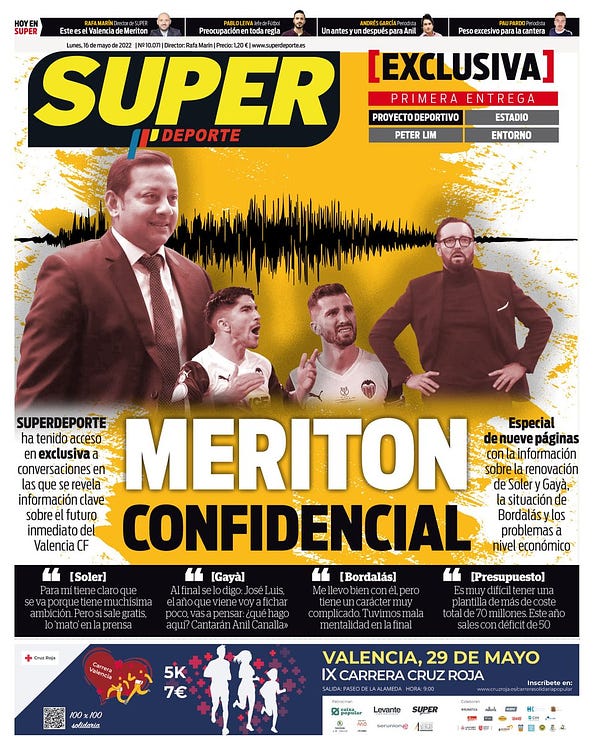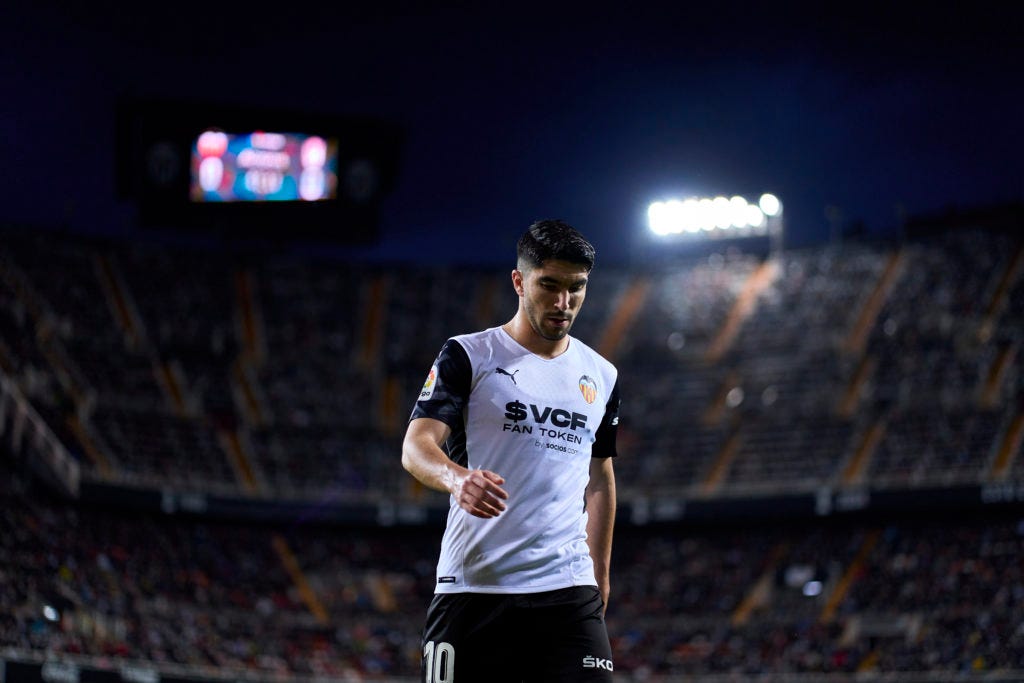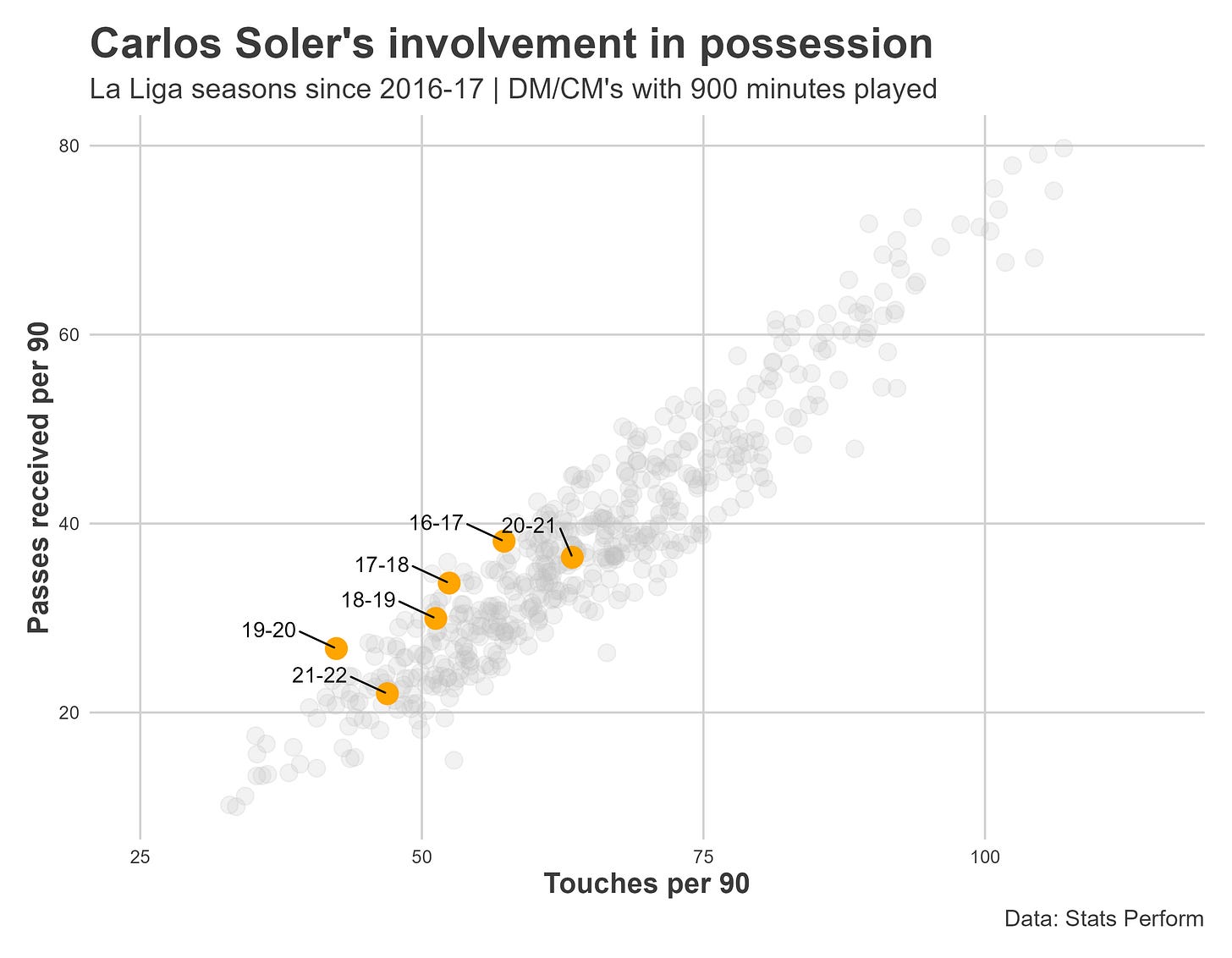Carlos Soler’s prime years
The 25-year-old’s future at Valencia is nearing a resolution, and it's one that will define the second half of his career.
Watching him on international duty in March, Carlos Soler looked precisely like, well, a Spanish midfielder. Crisp with his passing, attuned to the state of play, and plenty intelligent of when and where to be on the pitch, the 25-year-old would be a dependable option to fill out Spain’s 2022 World Cup squad.
The fact Soler is in the national team says a lot in isolation. The fact he is in a national team led by Luis Enrique says even more. In the run up to World Cup, the Spain coach seems like he couldn’t be any more certain of how they’re going to try win the thing, and in turn, what he will need to do it. Anyone who is on the plane to Qatar will be there because they fit Luis Enrique’s precise stylistic intentions.
"He started the season at a really high level with his club — we’ve been following him for a while and he featured at the Olympic Games. He’s a midfielder who is comfortable on the ball, he knows how to break lines with his passes, he arrives [in the box] well, he takes penalties, he’s good in terms of strategy. He’s really young and I hope he continues in this way.“ - Luis Enrique on Carlos Soler (September 2021)
In short, Luis Enrique won’t tolerate any roughing in the flow of play. Eric Garcia will likely go over Iñigo Martínez, despite the latter being a much better defender; goalkeepers who are comfortable in possession will be heavily favoured; Mikel Merino — the country’s most all-terrain midfielder — likely won’t be selected; Barcelona players will feature heavily, even if there are players in those positions who had stronger seasons.
When asked about the lack of defensive height in March, Luis Enrique responded: “This isn’t Basketball — we play on the ground.”
It’s nothing new for Spain to be insistent on their control of play, but the 51-year-old is hyper-focused on the process. He is insistent in his search for the footballing elixir that can guide them to World Cup glory. And it will start and end with the ball.
Club versus country
When he’s not playing for Spain, Carlos Soler doesn’t look much like someone who would fit Luis Enrique’s criteria. Particularly this season, under Pepe Bordalás, the contrast between the style of football played with Spain and that with his club could hardly be more pronounced. Valencia are the least elaborate passing side in La Liga, averaging the fewest passes per sequence of play (2.3) and fewest sequences of 10+ uninterrupted passes per game (2.2). In the national team Soler plays between the midfield lines. For his club, he looks to run beyond the last line.
Valencia knew what they were getting with Bordalás — and it’s not on us mere mortals to say his approach is right or wrong — but the fact is in Soler’s case, his involvement in play this season has been disproportionate to his individual ability. It’s true that he is one of the best midfielders at arriving in the box and his movements in the final third are a big resource, but the onus is then on a Valencia side who don’t manage the ball particularly well to find him in the opposition half. If they can’t, well, Soler is prone to being detached from play. Even as the best midfielder at the club, dropping deep to get some touches on the ball and a sense of activity just doesn’t fit with Bordálas’ aims in that case.
In La Liga this term, Soler has received an average of 22 passes per 90. That’s the eighth-fewest of any central midfielder in the league, with the only players below him belonging to Cádiz, Getafe or Alavés. As an example, his fellow international teammate Koke doesn’t play in a ball-dominant side at club level either, but he sees significantly more passes aimed in his direction (53 per 90). Quite simply, Soler’s involvement with the ball is just remarkably low for a player who is one of the consensus top Spanish midfielders.
At this point, some may be keen to point out he’s scored 11 goals in La Liga this season - the joint-most for Valencia, and a big return for a central midfielder. The caveat is that seven of those have been penalties. Indeed, his return of four non-penalty goals, which seems fairly modest, is actually his joint-most in a single league season. It begs the question: for a player who is rightly or wrongly defined as a llegador, have Valencia ever really extracted the best of Soler?
Although his contribution in possession has dipped to its lowest ever in 2021-22, his career at Valencia has largely played out within this same environment of direct, reactive football. During their time in charge, none of the last six coaches Soler has played under — Pepe Bordalás, Voro, Javi Gracia, Albert Celades, Marcelino and Cesare Prandelli — have averaged more possession than their opponents in La Liga.
In fact, in the most successful period of his time at the club, under Marcelino between 2017 and 2019, Soler was shifted out to the right wing in a 4-4-2, and was totally unrecognisable from the patient passing midfielder that had bloomed into his later years at youth level. Nobody expected that to be the case and even if it wasn’t optimal for him individually, Soler still found a way. He even developed a turn of pace he had no idea was there (sorry, Jordi Alba). Before joining the first team, Rubén Baraja had used Soler as a controlling midfielder in the B team due to his quality in playing from the back.
It’s a mark of his football intelligence that he has been able to shift between roles and contrasting styles of play throughout his career.
To be clear, Soler has never suggested any discontent with his role at Valencia or how they play. He concurs that a direct style and more transitional game is what Mestalla most identifies with, and he is simply far too professional to do anything but put himself at the service of the team, as a player who has spent his life at the club. But after six years at the club and his future now being dictated by an expiring contract — as well as already having won a trophy, which now seems unlikely to be repeated — he could be forgiven for thinking his playing career could look very different beyond 25.
When the interest from Barcelona appeared recently, it was hard not to ruminate on Soler’s career to date. The midfielder has spent his time at Valencia not doing many of the things Xavi Hernández would want from him at Camp Nou, and yet we know that he is capable of them. He’s done it for Spain as a youth player and as a senior international. His football IQ and maturity as a player is without question. And even if it wasn’t a glove-like fit from day one, you would trust in Soler’s Chameleon nature to find the desired form eventually.
“As well as being one of the best teams in the history of Spanish football, with so many titles, they created a school of play, the play that I like the most. I’m speaking about the era under Guardiola. These years are the best I’ve ever seen a team play football. There are different ways [to play], all of them valid. Right now in Valencia we have a style of play that I also like, but it’s right that I’ve also been with the international teams growing up and it’s a style quite similar to Barcelona, with the 4-3-3 system.” - Carlos Soler on Barcelona, Diario Sport (October 2021)
There is also the subject of age: as Soler starts heading towards 30, his game is going to be naturally more inclined towards control. A player of his intelligence is likely to gravitate back towards the centre of the pitch in time, and his reputation as a stampeding box attacker will fade with the years. One can’t help but consider how former teammate Dani Parejo has prolonged his career as one of the top midfielders in Spain by switching Valencia for more suitable surroundings in Villarreal, where control of the ball is more cherished. Soler probably won’t become a Parejo, but he could certainly follow a similar evolution as an effective passer and guide of tempo, in a team who don’t burn possession.
Closing the chapter?
With the financial issues that Valencia are facing, sales are imminent this summer. José Gayá, Carlos Soler and Goncalo Guedes are the obvious remedies to that problem. But while departures will remedy their balance sheet, they are likely to invoke a depression on the playing side. The talent that has separated Valencia from other mid-tier sides in La Liga this season looks likely to disappear, and few at Mestalla would expect it to be replaced adequately.
Soler could still well stick around at Mestalla. He has been at the club since he was seven years old, and the affinity there would be extremely difficult to leave behind — only he can weigh the pull that exists there. Increasingly, though, the attraction for renewing at the club is rooted in sentimental reasons, while the project from a playing aspect seems to be trending downwards. (And depending on how much you read into the recent leaks by Super Deporte from Anil Murthy, Valencia’s President, Soler might have already made peace with his decision to go.)


Winning the Copa del Rey for a second time would have been a fine way for Soler to sign out this season. The fact Valencia didn’t has little do with the 25-year-old, whose time as a senior player has been turbulent and always a case of putting the team before himself. Even the most diehard supporter of the club must acknowledge that his is a decision that has significant external pulls and internal pushes.
On the verge of signing a contract that will define the second part of his career, nobody would blame him for finally flipping the script. Whether it would be Barcelona, Juventus or the Premier League, the story of Soler’s career could still be very different in a second act.



